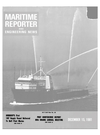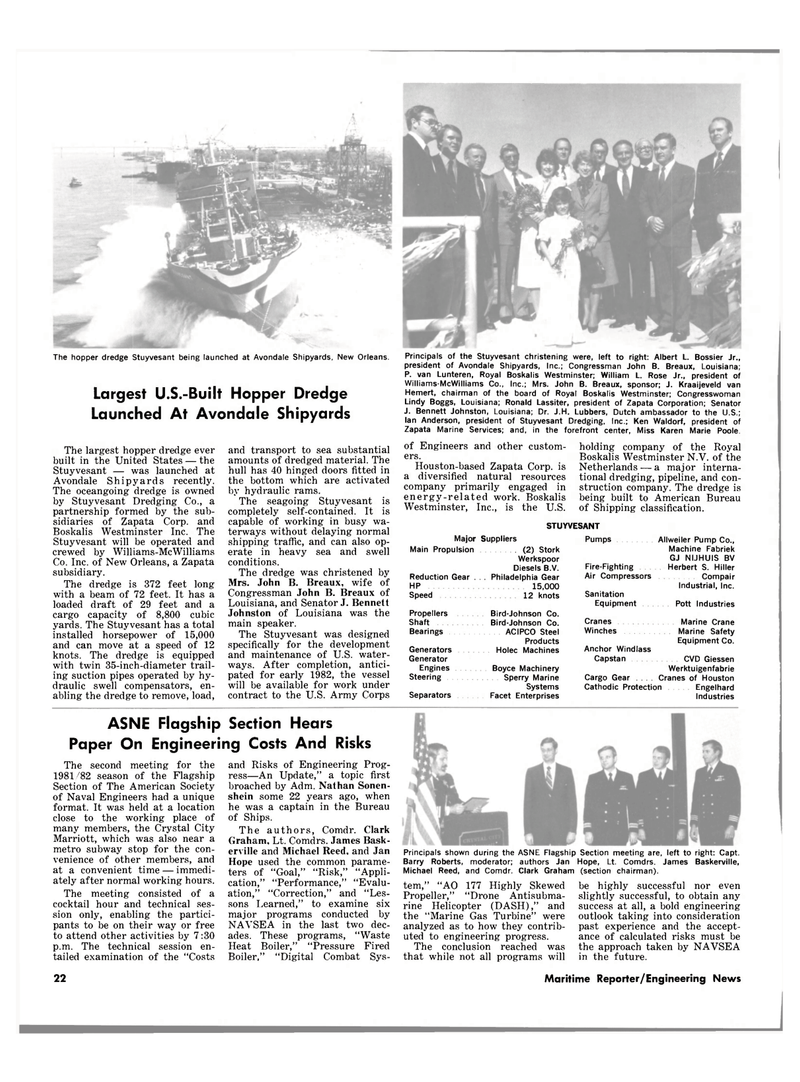
Page 18: of Maritime Reporter Magazine (December 15, 1981)
Read this page in Pdf, Flash or Html5 edition of December 15, 1981 Maritime Reporter Magazine
The hopper dredge Stuyvesant being launched at Avondale Shipyards, New Orleans.
Largest U.S.-Built Hopper Dredge
Launched At Avondale Shipyards
The largest hopper dredge ever built in the United States — the
Stuyvesant — was launched at
Avondale Shipyards recently.
The oceangoing dredge is owned by Stuyvesant Dredging Co., a partnership formed by the sub- sidiaries of Zapata Corp. and
Boskalis Westminster Inc. The
Stuyvesant will be operated and crewed by Williams-McWilliams
Co. Inc. of New Orleans, a Zapata subsidiary.
The dredge is 372 feet long with a beam of 72 feet. It has a loaded draft of 29 feet and a cargo capacity of 8,800 cubic yards. The Stuyvesant has a total installed horsepower of 15,000 and can move at a speed of 12 knots. The dredge is equipped with twin 35-inch-diameter trail- ing suction pipes operated by hy- draulic swell compensators, en- abling the dredge to remove, load, and transport to sea substantial amounts of dredged material. The hull has 40 hinged doors fitted in the bottom which are activated by hydraulic rams.
The seagoing Stuyvesant is completely self-contained. It is capable of working in busy wa- terways without delaying normal shipping traffic, and can also op- erate in heavy sea and swell conditions.
The dredge was christened by
Mrs. John B. Breaux, wife of
Congressman John B. Breaux of
Louisiana, and Senator J. Bennett
Johnston of Louisiana was the main speaker.
The Stuyvesant was designed specifically for the development and maintenance of U.S. water- ways. After completion, antici- pated for early 1982, the vessel will be available for work under contract to the U.S. Army Corps of Engineers and other custom- ers.
Houston-based Zapata Corp. is a diversified natural resources company primarily engaged in energy-related work. Boskalis
Westminster, Inc., is the U.S. holding company of the Royal
Boskalis Westminster N.V. of the
Netherlands-—a major interna- tional dredging, pipeline, and con- struction company. The dredge is being built to American Bureau of Shipping classification.
STUYVESANT
Major Suppliers
Main Propulsion (2) Stork
Werkspoor
Diesels B.V.
Reduction Gear . . . Philadelphia Gear
HP 15,000
Speed 12 knots
Propellers Bird-Johnson Co.
Shaft Bird-Johnson Co.
Bearings ACIPCO Steel
Products
Generators Holec Machines
Generator
Engines Boyce Machinery
Steering Sperry Marine
Systems
Separators Facet Enterprises
Pumps Allweiler Pump Co.,
Machine Fabriek
GJ NIJHUIS BV
Fire-Fighting Herbert S. Hiller
Air Compressors Compai
Industrial, Inc.
Sanitation
Equipment Pott Industries
Cranes Marine Crane
Winches Marine Safety
Equipment Co.
Anchor Windlass
Capstan CVD Giessen
Werktuigenfabrie
Cargo Gear .... Cranes of Houston
Cathodic Protection Engelhard
Industries
Principals of the Stuyvesant christening were, left to right: Albert L. Bossier Jr., president of Avondale Shipyards, Inc.; Congressman John B. Breaux, Louisiana;
P. van Lunteren, Royal Boskalis Westminster; William L. Rose Jr., president of
Williams-McWilliams Co., Inc.; Mrs. John B. Breaux, sponsor; J. Kraaijeveld van
Hemert, chairman of the board of Royal Boskalis Westminster; Congresswoman
Lindy Boggs, Louisiana; Ronald Lassiter, president of Zapata Corporation; Senator
J. Bennett Johnston, Louisiana; Dr. J.H. Lubbers, Dutch ambassador to the U.S.;
Ian Anderson, president of Stuyvesant Dredging, Inc.; Ken Waldorf, president of
Zapata Marine Services; and, in the forefront center, Miss Karen Marie Poole.
ASNE Flagship Section Hears
Paper On Engineering Costs And Risks
Principals shown during the ASNE Flagship Section meeting are, left to right: Capt.
Barry Roberts, moderator; authors Jan Hope, Lt. Comdrs. James Baskerville,
Michael Reed, and Comdr. Clark Graham (section chairman).
The second meeting for the 1981 82 season of the Flagship
Section of The American Society of Naval Engineers had a unique format. It was held at a location close to the working place of many members, the Crystal City
Marriott, which was also near a metro subway stop for the con- venience of other members, and at a convenient time — immedi- ately after normal working hours.
The meeting consisted of a cocktail hour and technical ses- sion only, enabling the partici- pants to be on their way or free to attend other activities by 7:30 p.m. The technical session en- tailed examination of the "Costs and Risks of Engineering Prog- ress—An Update," a topic first broached by Adm. Nathan Sonen- shein some 22 years ago, when he was a captain in the Bureau of Ships.
The authors, Comdr. Clark
Graham. Lt. Comdrs. James Bask- erville and Michael Reed, and Jan
Hope used the common parame- ters of "Goal," "Risk," "Appli- cation," "Performance," "Evalu- ation," "Correction," and "Les- sons Learned," to examine six major programs conducted by
NAVSEA in the last two dec- ades. These programs, "Waste
Heat Boiler," "Pressure Fired
Boiler," "Digital Combat Sys- tem," "AO 177 Highly Skewed
Propeller," "Drone Antisubma- rine Helicopter (DASH)," and the "Marine Gas Turbine" were analyzed as to how they contrib- uted to engineering progress.
The conclusion reached was that while not all programs will be highly successful nor even slightly successful, to obtain any success at all, a bold engineering outlook taking into consideration past experience and the accept- ance of calculated risks must be the approach taken by NAVSEA in the future. 22 Maritime Reporter/Engineering News

 17
17

 19
19
